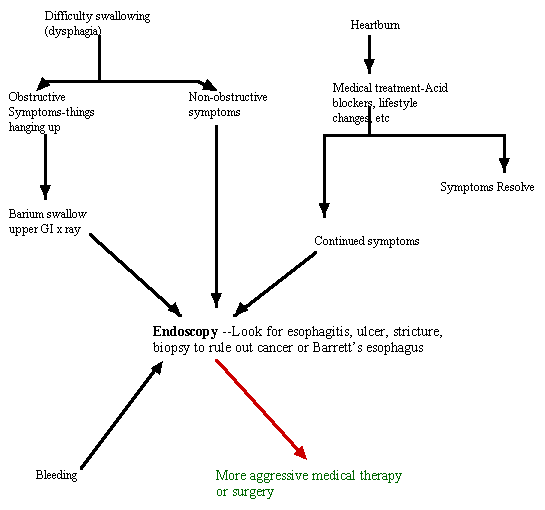Gastroesophageal
Reflux Disease (GERD)
GERD is a collection
of symptoms and pathologic changes in the upper
aerodigestive tract that are related to gastroesophageal
reflux (the backwash of stomach contents which are often
very acidic into the esophagus). The most common symptom
associated with this condition is heartburn which is very
common in our population and which usually does not
require any treatment. Acid reflux into the esophagus can
cause esophagitis which is inflammation of the
mucosa lining the esophagus. GERD can cause symptoms
outside of the esophagus such as laryngitis, asthma, and
aspiration pneumonia when the reflux extends all of the
way up the esophagus and into the mouth. If this occurs
at night when the person is sleeping, then choking and
aspiration into the lungs can occur.
Whereas up to 40% of
the population experiences heartburn at some time, only
about 60% of those persons have significant GERD. The
incidence of symptoms increases with age and are more
common during pregnancy probably because of the hormonal
effects on the lower esophageal sphincter and by the
increased intraabdominal pressure. Many people find that
their symptoms increase with small increases in their
weight and with the tightening that they feel at their
waist line. Often losing 8-10 lbs. is all that it takes
to bring this condition under control. About 12% of
people that have chronic GERD will develop Barrett's
esophagus. This is a change in the cells lining the
esophagus and as it progresses, it can be associated with
cancerous changes developing.
What Causes
GERD?
Several factors
conspire to produce the symptoms of GERD. 1).The lower
esophageal sphincter (valve) mechanism may not function
properly and allows free reflux of stomach contents back
up into the esophagus. 2).The esophagus and its
peristalsis(what moves food from the mouth to the
stomach) may be defect so that once reflux occurs, it
cannot be cleared from the esophagus. 3).The stomach
doesn't empty properly and stomach contents backs up and
puts more pressure on the lower esophageal sphincter. The
most common cause of GERD is 1 --an incompetent lower
esophageal sphincter. Surgical procedures to treat reflux
are aimed at recreating a competent lower esophageal
sphincter.
Hiatal Hernia and
GERD
Many patients are told
that they have a "high hernia" that causes their
heartburn and symptoms of GERD. This is only partially
true. Many patients that have hiatal hernias do not
experience reflux symptoms. Many patients that have
severe reflux symptoms do not have hiatal hernias. Large
hiatal hernias probably due contribute to the severity of
some patients symptoms and repair of the hernia may alone
improve their symptoms

Lifestyle Changes
to Improve/Treat GERD
1. Lose weight-it is
surprising how the loss of a few pounds can markedly
improve symptoms.
2. Elevate the head of
your bed on 6" blocks.
3. Take your H2
blocker (Zantac, Pepcid, etc), your proton pump inhibitor
(Prilosec) and/or your promotility agent (Propulsid,
Reglan) as directed by you physician.
4. Avoid late evening
meals (after 6 pm)
5. Avoid nicotine,
caffeine, chocolate, alcohol, fatty foods, and
peppermint.
6. Avoid tight fitting
clothing (jeans, girdles, etc)
Surgery for
GERD
After a workup that
may include an upper G I barium swallow, an endoscopy, an
esophageal manometry, and a 24 hour pH monitoring, the
patient may be referred for a discussion of
surgical
therapy.
This is a strategy to reconstruct the competency of the
lower esophageal sphincter mechanism.